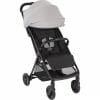Parenting
Understanding Hypersalivation During Pregnancy
Expecting a baby can bring about a myriad of pregnancy symptoms, one of which is hypersalivation during pregnancy. Here’s an informative guide on this particular condition.
What is hypersalivation during pregnancy?
Hypersalivation during pregnancy, also known as ptyalism gravidarum, is a phenomenon where individuals produce an excess amount of saliva while expecting. This occurrence is more prevalent in the initial trimester and often diminishes as the pregnancy progresses.
Why is my oral cavity generating abundant saliva in the morning?
The presence of hypersalivation during pregnancy can be triggered by various factors which include:
• Dehydration
• Acid reflux
• Sinus congestion
• Sleeping with an open mouth
When does the overproduction of saliva cease during pregnancy?
The duration varies from person to person, but typically hypersalivation tends to subside after the initial trimester (from conception to 12 weeks). Some individuals may not undergo this condition at all, while others may encounter it later in their pregnancy or persist with it throughout.
What are the methods to alleviate hypersalivation during pregnancy?
There is currently no specific treatment for hypersalivation, so it is suggested to use tissues, napkins, or cups to manage any excess saliva. You may also try to reduce saliva production by:
• Consuming an adequate amount of water to stay hydrated
• Chewing gum
• Sucking on hard candies
• Maintaining good oral health
• Avoiding pungent or acidic foods
What prescribed drugs are used for hypersalivation during pregnancy?
Although medication is not usually recommended for this condition, some treatments may be prescribed by healthcare providers in severe cases of hypersalivation. Phenothiazine and belladonna have been utilized to reduce saliva production, but they can result in dry mouth and constipation during pregnancy.
If you are struggling with hypersalivation, consult with a healthcare professional for appropriate guidance.
Arabella Horspool serves as a Commercial Content Writer specializing in Mother&Baby at Bauer Media. She delights in reading, cooking, and spending quality time with her diverse array of pets.
How we craft our articles and evaluations
Mother & Baby is steadfast in ensuring the enduring value and dependability of our information, which is why we solely rely on credible sources such as the NHS, peer-reviewed medical papers, or the counsel of respected healthcare practitioners including doctors, GPs, midwives, psychotherapists, gynaecologists, or other medical experts. Whenever feasible, our articles undergo medical review or contain expert insights. Our authors are consistently abreast of the latest safety advisories concerning all the products we endorse and adhere rigorously to reporting protocols to ensure the credibility of our content. Always seek advice from a medical expert if you have any concerns. Our articles are not a substitute for professional advice from your GP or midwife.

















